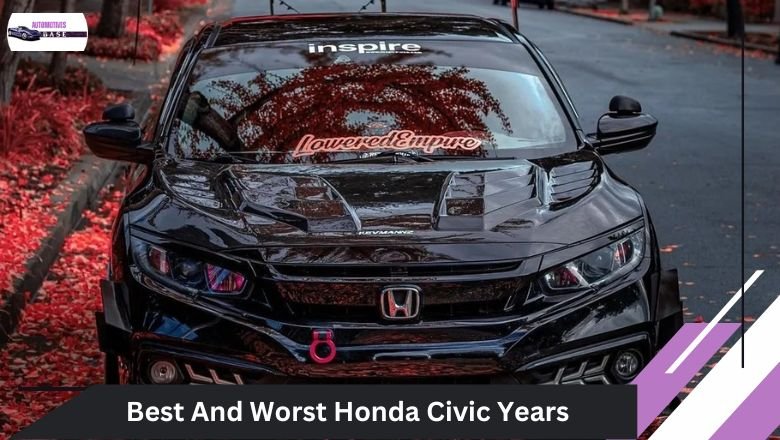The best and worst Honda Civic years, and the thrilling saga have been described fully in this article. The history of Honda Civic is a rollercoaster ride of highs and lows from revolutionary advancements in technology to infamous recalls that send shockwaves through the industry.
The Honda Civic has been a long staple in the automotive world, beloved for its reliability, efficiency, and sleek design..Join us as we explore which model years have redefined excellence in compact cars and which ones have left drivers wishing they had choosen differently.
Honda Civic Generations
The Honda Civic has continued to evolve and maintain its popularity throughout the years, with each generation bringing new features and improvements to the table. The Civic has solidified its reputation as a reliable and efficient compact car From its humble beginnings in 1972 to the present day.
The table showcasing the Honda Civic generations from 2001 onwards highlights the continuous innovation and advancements made by Honda in keeping up with changing trends and technologies.
| Generations | Years |
|---|---|
| 7th generation (ES/EN) | 2001-2005 |
| 8th generation (FA1) | 2006-2011 |
| 9th generation (FB) | 2012-2015 |
| 10th generation (FC1/FC2/FC5) | 2016-2021 |
| 11th generation (FE) | 2022-Present |
Honda Civic Best, Neutral, and Worst Years
It is important to consider the factors that can impact the overall performance and reliability of the vehicle in evaluating the best, neutral, and worst years of the Honda Civic.
- Owner-reported reliability (surveys)
- Annual maintenance costs
- Safety ratings
- Consumer Reports reliability scores
- Consumer Reports owner satisfaction scores
- NHTSA recalls, investigations, and complaints
- Edmunds owner ratings
- JD Power owner ratings
- Kelley Blue Book (KBB) owner ratings
- VehicleHistory owner ratings
- Cars.com owner ratings
Views of ratings will be represented in the upcoming graph.
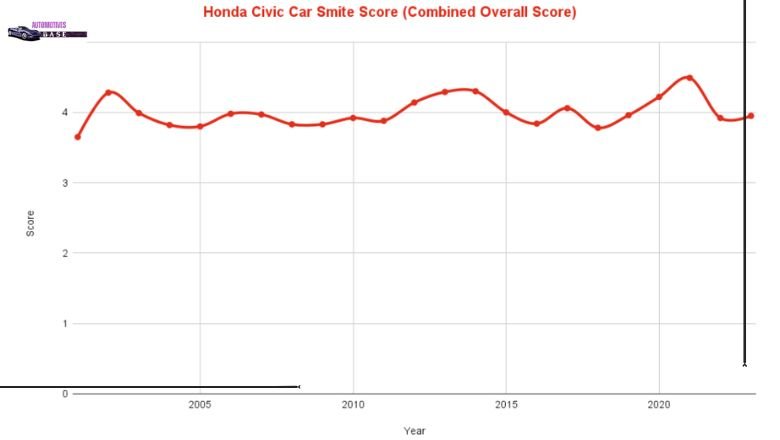
Honda Civic Years are categorized into best, worst and neutral years.
| Generations | Best Years | Worst Years | Neutral Years |
|---|---|---|---|
| 7th generation (ES/EN) | 2004 2005 | N/A | 2001 2002 2003 |
| 8th generation (FA1) | 2009 2010 2011 | N/A | 2006 2007 2008 |
| 9th generation (FB) | 2013 2014 2015 | N/A | 2012 |
| 10th generation (FC1/FC2/FC5) | 2019 2020 2021 | 2017 2018 | 2016 |
| 11th generation (FE) | 2023 | N/A | 2022 |
Honda Civic Reliability By Year: 7th Generation (2001-2005)
The 7th generation of the Honda Civic brought significant changes to the lineup, with a notable shift in design and engineering. The later years of this generation, specifically 2004 and 2005 models, are regarded as the best years for the Honda Civic. These models typically offer improved performance, reliability, and satisfaction for drivers.
Some caution may be warranted when considering the 2001, 2002, and 2003 Honda Civic models. These years are sometimes considered ones to avoid due to potential issues that have been reported by owners and reviewers.
Best Year For Honda Civic: 2004, 2005
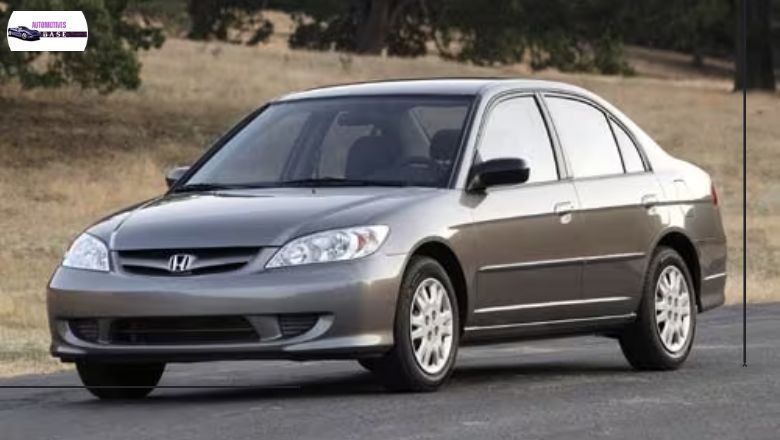
These years marked advancements in technology with improved audio systems, power lock doors, and upgraded air conditioning units. Safety features were also notable, with standard anti-lock brakes and dual front airbags across all trims. The EX trim even offered side airbags for added protection.
The 2004 and 2005 Honda Civic models are highly regarded for their fuel efficiency, engine options, and performance. The range of engine choices, with the popular 1.7L SOHC VTEC engine, provided a good balance of power and efficiency. The availability of both automatic and manual transmissions catered to different driving preferences.
Some owners did report minor electronic glitches such as issues with the radio and power windows while these Honda Civics received outstanding ratings from Edmunds and were praised for their overall quality.
The Worst Years: 2001, 2002, 2003
It is advisable to steer clear of the 2001, 2002, and 2003 models due to common transmission issues and potential costly repairs if you are considering purchasing a Honda Civic from the early 2000s. Owners have reported problems such as slipping transmissions, delays in gear changes, and even complete transmission failure in some cases.
Recalls were also a significant concern during these years, with issues ranging from exterior lighting malfunctions to fuel pump problems that could result in engine stalls. They also offered benefits like good fuel efficiency and a compact, agile design while the 2001-2003 Honda Civics may have had their drawbacks, such as persistent CVT transmission concerns and sporadic electrical issues.
Honda Civic Best And Worst Years 8th Generation (2006-2011)
The 8th generation of the Honda Civic, launched in 2006, brought a significant shift in design with its futuristic two-tier dashboard and sleek body lines. The initial years of this generation, specifically 2006, 2007, and 2008, were met with mixed reviews due to some quality control issues and lackluster performance compared to previous models.
The later years of the 8th-generation Honda Civic, particularly 2009, 2010, and 2011, saw improvements in terms of reliability, performance, and satisfaction among consumers. These years marked a return to form for Honda Civic enthusiasts as the company addressed earlier concerns and refined the model to deliver a more enjoyable driving experience.
The Best Years: 2009, 2010, 2011
The 2011 Honda Civic stands out as a top choice in this generation due to its improved fuel economy, making it a popular option for those seeking efficiency without sacrificing performance. The 2009 and 2010 models are also highly reliable choices within the 8th-generation lineup, featuring the 1.8L SOHC i-VTEC engine.
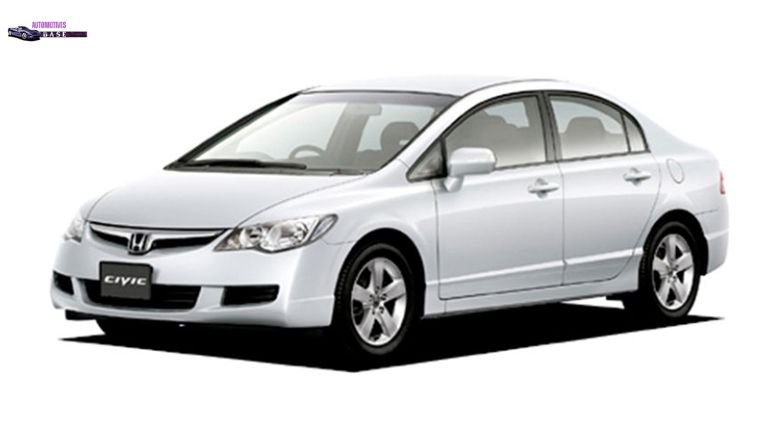
It also offers a balance of power and fuel efficiency with their 5-speed automatic or manual transmissions. These years introduced trim levels ranging from the base DX to the sporty Si variant, providing options for various preferences. The introduction of the Civic Hybrid and natural-gas-powered GX variant during this
period showcased Honda’s commitment to innovation and environmental sustainability.
The Worst Years: 2006, 2007, 2008
It is highly recommended to proceed with caution if you are considering purchasing a Honda Civic from the years 2006, 2007, or 2008. These particular models have been associated with engine cracks leading to coolant leakage and other serious issues.
They did settle a class-action lawsuit which resulted in engine replacements for many affected owners. Suspension problems were common during these years, with reports of excessive rear tire wear due to rear control arm issues causing adverse rear camber.
Recalls were also a significant concern for owners of the 2006-2008 Honda Civics. Problems ranged from critical components like the engine and suspension to exterior lighting issues.
Best And Worst Honda Civic Years: 9th Generation (2012-2015)
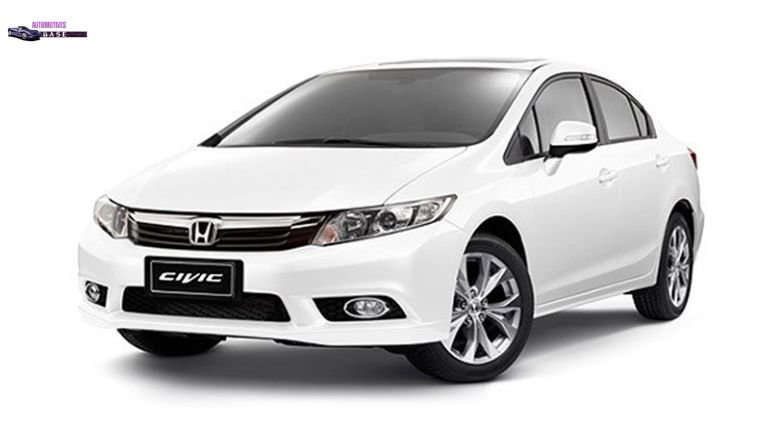
The 9th generation Honda Civic, introduced in 2012, marked a significant evolution for the popular model. This generation of Civics has garnered praise for its reliability and affordability With refined aesthetics and an upgraded technology suite.
The subsequent years – 2013, 2014, and 2015 – are considered among the most reliable in this generation While the 2012 model year is often cited as one to avoid due to some reported issues. Drivers have appreciated the balance struck by the 9th generation Civic between performance, comfort, and value.
The Best Years: 2013, 2014, 2015
The 2013, 2014, and 2015 Honda Civic models have garnered high ratings from reputable platforms. These years are considered to be the best of the generation due to their reliable performance and fuel efficiency. The 1.8L four-cylinder engine paired with a 5-speed manual or CVT transmission in these models strikes a good balance between power and economy.
The trim options available in these years cater to a wide range of preferences, from the base LX to the sporty Si and top-tier EX-L models. The exterior facelift given to the 2013 Civic addressed previous criticisms of bland aesthetics, enhancing its overall appeal.
The upgraded interiors of Honda vehicles, featuring superior materials and improved ergonomics, have received positive feedback from consumers. The introduction of the advanced infotainment system, HondaLink, in 2014 was a significant enhancement that enabled smartphone integration for features like navigation and streaming audio.
The safety aspect was emphasized with the introduction of the Honda LaneWatch blind-spot display in the same year, providing added peace of mind for drivers. There were some minor complaints regarding the responsiveness of the CVT transmission while the upgrades were generally well-received. Some users found it to be slightly sluggish, which could be an area for improvement in future models.
The Worst Years: 2012
There were several reasons why some people chose to avoid it while the 2012 Honda Civic did have its strengths. The main issues critics pointed out was the uninspired design of the car, which may not have appealed to those looking for a more modern or stylish vehicle.
There were complaints about ride quality and cabin noise isolation, making for a less comfortable driving experience in terms of performance, while the 1.8L engine was reliable. Owners also reported concerns such as power steering loss, transmission glitches, and electrical problems, which could be frustrating and potentially costly to fix.
A problematic left driveshaft raised safety concerns about potential loss of motive power in rare instances. These issues highlighted significant areas for improvement that led some consumers to look elsewhere for their next vehicle purchase while the 2012 Honda Civic received decent ratings from sources like J.D. Power.
Best, Neutral & Worst Years for Honda Civic 10th Generation (2016-2021)
The 10th generation Honda Civic, introduced in 2016, marked a significant shift in design and technology for the popular model. The bold and futuristic redesign received mixed reviews initially, with some praising its innovative approach while others found it polarizing.
The Civic continued to evolve and improve, with the 2019, 2020, and 2021 models being widely regarded as some of the best in the lineup as the year progressed. It still laid the foundation for the improvements that followed while the 2016 Civic may not have been as well-received compared to its successors
The Best Years: 2019, 2020, 2021
The 10th generation Honda Civic models from 2019, 2020, and 2021 have garnered top rankings on various platforms. These models were equipped with two engine options – the 2.0L four-cylinder and the turbocharged 1.5L four-cylinder – offering a good balance between performance and fuel efficiency.
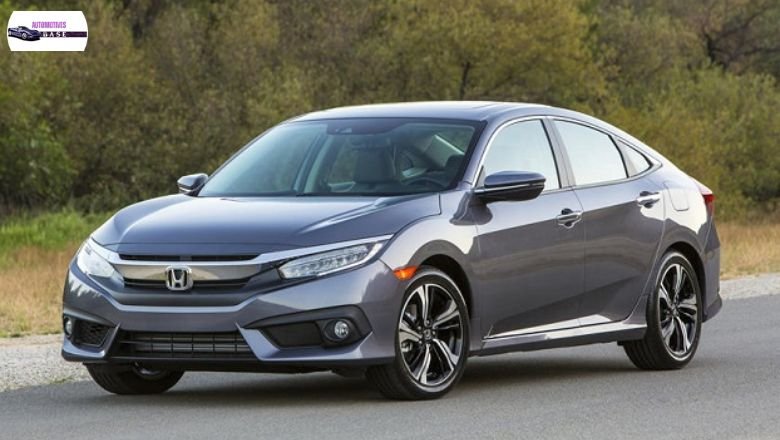
The availability of both manual transmission and CVT added to the versatility of these vehicles. Honda’s introduction of the Honda Sensing Suite in these years was a significant highlight, providing advanced safety features such as collision mitigation braking and adaptive cruise control.
The Neutral Years: 2017, 2018
The 2017 and 2018 Honda Civics marked a transition period for the popular model, focusing on refining existing features and addressing any issues from the previous year. The engine options remained largely consistent, with a particular emphasis on enhancing the responsiveness of the CVT transmission based on user feedback.
Honda continued to prioritize safety by gradually incorporating the Honda Sensing suite into various trims, showcasing their commitment to driver assistance technology. The reintroduction of the Hatchback variant after a ten-year absence was one notable development during these years.
The Worst Years: 2016
It is important to note that not all owners may experience these issues while the 2016 Honda Civic does have its fair share of reported problems. The sticky and jerky steering wheels and AC malfunctions are certainly concerning, but it’s worth mentioning that Honda took steps to address the AC problems with a warranty extension for the condenser. The infotainment system glitches, while frustrating, can be resolved with software updates or maintenance.
It is always recommended to do thorough research and consider factors like maintenance history and individual driving habits before making a decision on a used car purchase. Many owners still find it to be a reliable and enjoyable vehicle while there may be reported problems with the 2016 Honda Civic.
Best And Worst Years For Honda Civic:11th Generation (2022-2023)
The 11th generation of the Honda Civic represents a significant evolution in design and performance, emphasizing maturity and refinement over boldness. The 2023 model year stands out as the best iteration of this generation, offering improved features and enhancements for a more enjoyable driving experience. The 2023 Honda Civic appeals to both longtime fans of the brand and new customers seeking reliability and comfort with sleek styling and advanced technology.
The 2022 Honda Civic has been marked as a year to avoid due to a relatively high number of owner complaints. The 2022 model may have some issues that could impact satisfaction while still maintaining the core qualities of the Civic line, such as fuel efficiency and practicality.
The Best Years: 2023
The Honda Civic made a significant impact in the automotive market by solidifying its position as a class leader in 2023. The redesigned exterior of the model showcased cleaner lines, giving it a more elegant and mature appearance.
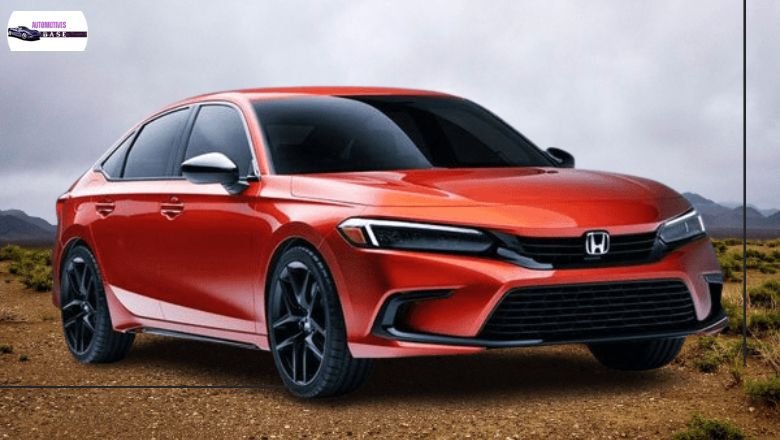
The Honda Civic offers four trim levels – LX, Sport, EX, and Touring – each catering to different preferences and needs. The sedan and liftback models come equipped with either a 2.0-liter four-cylinder motor in the LX and Sport models or a 1.5-liter turbocharged four-cylinder engine in the EX and Touring models.
The Worst Years: 2022
The 2022 Honda Civic, as the debut model for the 11th generation, did encounter some teething issues that drew attention from consumers.The sticky steering wheel problem inherited from the previous generation, which impacted the driving experience and raised safety concerns was one of the feature.
Reports of sporadic system glitches involving features like the Collision Mitigation System and Adaptive Cruise Control were noted by some users, leading to unintended activations and potential safety risks. These issues prompted scrutiny and highlighted areas for improvement in future iterations of the vehicle.
It is important for Honda to address these issues promptly through recalls or software updates to ensure customer satisfaction and maintain a reputation for reliability. Honda can enhance the ownership experience for customers and uphold its commitment to delivering high-quality vehicles by acknowledging and resolving these teething problems swiftly.
Is Honda Civic Similar To Honda CRV?
Yes, the Honda Civic and Honda CR-V are both vehicles manufactured by Honda, but they belong to different segments. The Honda Civic is a compact car, known for its sporty design and fuel efficiency, while the Honda CR-V is a compact SUV with more space and versatility for passengers and cargo.
Both vehicles share some similarities in terms of reliability, quality build, and advanced technology features common in Honda vehicles. Their primary differences lie in their size, body style, and intended use. The Civic is ideal for urban commuting and small families, while the CR-V offers more room for outdoor adventures or larger families needing extra space.
Recalls Vs. Customer Complaints
Honda Civic Recalls and customer complaints are both important indicators of potential issues. Recalls typically occur when there is a safety or performance issue that could pose a risk to consumers, prompting the manufacturer to take action to address it.
Customer complaints can provide valuable feedback on various aspects of the vehicle’s design, functionality, or quality that may not rise to the level of a recall but still impact the overall customer experience. Customer complaints offer a more nuanced perspective on how well a product meets consumer expectations.
Honda Civic Average Resale Values
Honda’s Civic Resale Values over the years is shown below.
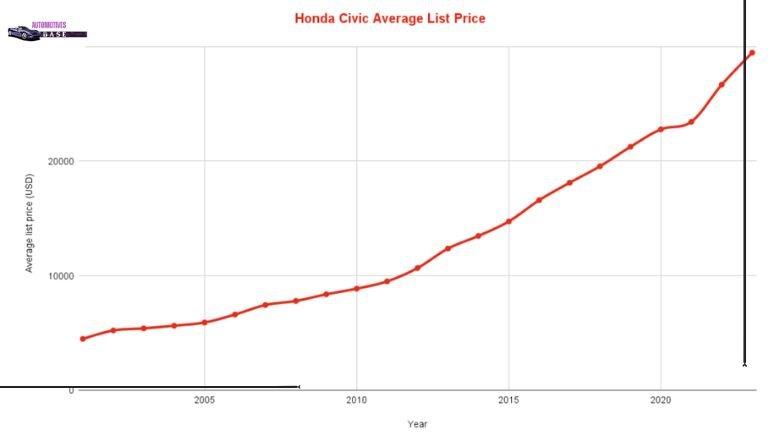
Conclusion
The Best And Worst Honda Civic Years shared by the Honda Civic throughout its long history. The 2012 model year falls short with its transmission issues while the 2006 model year stands out as one of the best for its reliability and performance.
It is important for potential buyers to thoroughly research and consider all factors before purchasing a Honda Civic. Consumers can make a well-informed decision that meets their needs and expectations by being informed about both the best and worst years.
FAQ’s
What Years To Avoid With A Honda Civic?
The year to potentially avoid is the 2001 Honda Civic, as it had reported problems with transmission failure and engine issues. Another year to be cautious of is the 2012 Honda Civic, which faced criticism for its lackluster interior quality and handling.
Which Honda Civic Year Is The Best?
The best Honda Civic year can vary depending on individual preferences and needs. Many enthusiasts consider the 2017 Honda Civic to be one of the best years due to its modern design, comfortable interior, and advanced technology features. Known for reliability and solid performance, the 2006 Civic is praised for its practicality and durability.
Is A Used Honda Civic A Good Car?
Yes, a used Honda Civic is generally considered to be a good car. The Honda Civic has been a popular choice among consumers for many years known for its reliability, fuel efficiency, and low maintenance costs.

